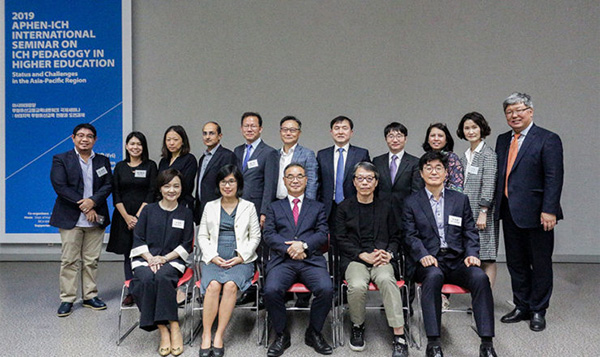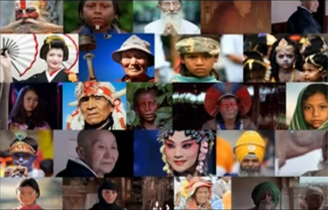ICH in Higher Education: Context, Protection Policy, Social Awareness
 |
| Participants at the International Seminar on ICH and Higher Education in May 2019 ⓒ ICHCAP |
Many issues arise in integrating ICH and higher education—from rote facility of education to the unreinforced role of cultural bearers; from ghostly legal implementation of ICH-informed laws to public ignorance. These issues are real and demand holistic comprehension and intervention from stakeholders. At the 2019 APHEN-ICH International Seminar on ICH Pedagogy in Higher Education, related issues were presented by five speakers, and the public had a chance to give their opinions. The seminar, focusing on the status of ICH-informed education in the Asia-Pacific region and its challenges in reference to UNESCO’s Overall Results Framework (ORF), was organized to deliberate on practical exposure to the teaching of ICH in different contexts.
The one-day seminar, held on 10 May 2019 at the National Museum of Korea, opened with a keynote speech delivered by Ms. Duong Bich Hanh of the UNESCO Bangkok Office. Her talk grounded the yet-to-be-mapped-out efforts of ICH integration into higher education in terms of the ORF. Conceived and drafted from 2013 to 2018, the ORF was designed to guide stakeholders in implementing the 2003 UNESCO Convention from planning to assessment. Among the eight thematic areas mentioned in the ORF, Ms. Hanh focused on transmission and education and discussed indicators relevant to the seminar as well as the factors to be used for assessment. (Read the ORF online.)
The first part of the seminar was dedicated to hearing cases from India and the Philippines. and Neel Kamal Chapagain, Director of the Centre for Heritage Management at Ahmedabad University in India, presented a pedagogical paradigm based on context and played primarily by teachers, students, and communities. Speaking from Bloom’s Taxonomy of Learning, Dr. Chapagain maintained that a contextual approach to ICH study should move beyond comprehension to ultimately enable students to create something out of their learning experience. Prof. Martin Genodepa, Vice-Chancellor for Planning and Development of the University of the Philippines in Visayas, followed by providing a map of Philippine laws chiefly responsible for protecting cultural heritage. He underscored the laws in the archipelago that tacitly pronounce the responsibility of the Philippine educational system in housing ICH. His talk highlighted that though a cultural policy exists in a particular contexts, specifically in the developing world, its irregular implementation impedes any effort to successfully integrate ICH and education.
The second part of the seminar focused on ICH education in the Republic of Korea and Japan. Prof. Ayako Fujieda of Kyoto University and Prof. Shin Suk of the Korea National University of Cultural Heritage mentioned more similarities than differences in the cases they presented. As the Republic of Korea and Japan have explored ICH in deeper legal and social levels than other countries, having ratified the UNESCO 2003 Convention in 2005 and 2004, respectively, the state of their ICH education is much more stable, supporting numerous training centers and educational facilities that certainly widen social awareness and public accessibility to ICH inventorying mechanisms and transmission practices. Hearing how ICH education aides transmission in the Republic of Korea and Japan, what other Member States could learn is the importance of maintaining a cultural mindset that ICH is a part of citizenship, and as citizens it is our right and responsibility to know the nature of ICH, how its values are formally and informally upheld, and the systems in place geared toward its generational transmission.
Address: 81, Laiguangying West Road, Chaoyang District, Beijing, China
Zip Code: 100021
Tel: 86-10-64966526
Fax: 86-10-64969281
E-mail: administration@crihap.cn
NEWSLETTER
Leave us your e-mail address, we'll let you know about current events.


